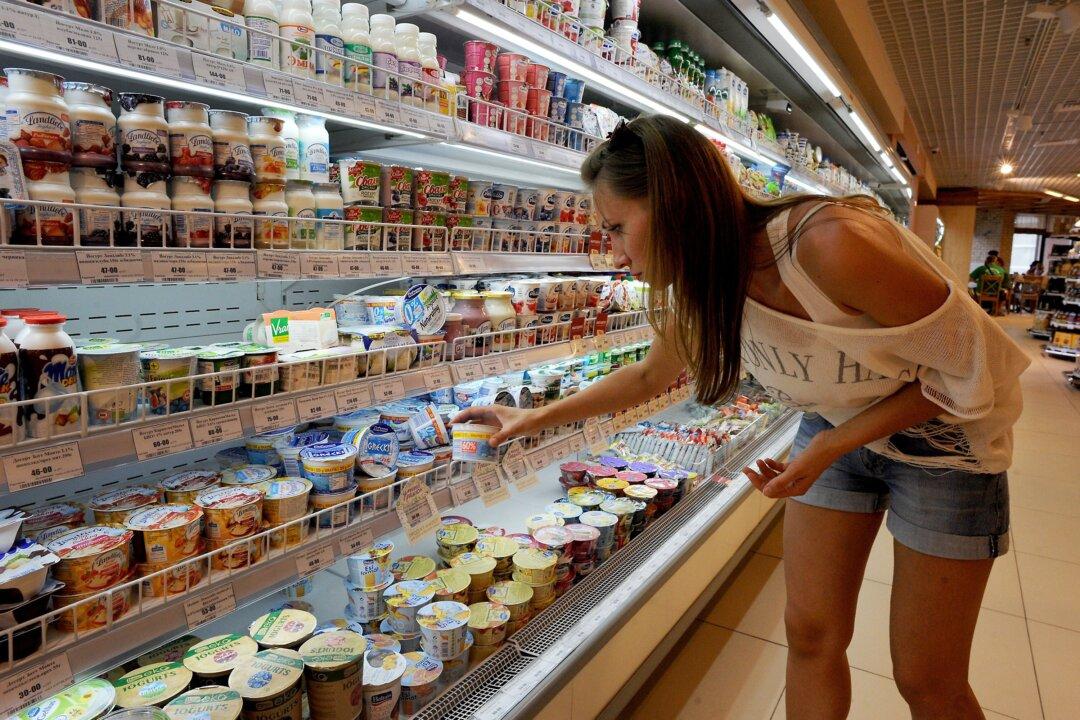BRUSSELS—Counter-sanctions introduced by Russia in response to European sanctions are hurting some European countries, such as Latvia and Lithuania.
Those mainly affected by the sanctions are farmers and others in the food business, as Russia has banned many agricultural imports form the EU and other western countries for at least a year.
The EU has pledged $169 million (125 euros) to help its food producers recover the loss, but this is only a fraction of what EU sanctions are costing Russia.
“The European economy is 23 percent of the world, while Russian is about 3 percent,” said Artis Pabriks, a member of the European Parliament from Latvia who attended a European Parliament trade committee hearing on Wednesday.
“Russian sanctions are hitting some smaller countries within the Union, [but] if the Union stands here united, then basically such Russian counter-sanctions can’t affect the European economy very much.”
In the short term, European food producers are losing profits. But they can also use this as a chance to find new markets, which would benefit them in the long-term if the EU and Russia continue their political standoff.
The effect on the Russian economy is less clear, but it appears to be taking a hit. The Russian currency the ruble, which has been decreasing in value for years, dropped 1 percent about a week after sanctions by major western countries went into effect earlier this month.
Interfax news, a non-governmental Russian news agency based in Moscow quoted the Russian Trade and Economic Development Minister, Alexei Ulyukayev, as saying, “The negative effect from these sanctions is delayed: they will fall on the future period and we will have to live with that for a long time.”
Russian politicians have downplayed the effects sanctions would have on Russia and have even tried to cast their own sanctions as a chance for Russia to build up its domestic market. But as the sanctions continue with no clear end in site, Russian politicians have changed their tune.
Russian Finance Minister, Anton Siluanov, announced last week that Russia is preparing a crisis fund to help companies hit by sanctions. Russia will dip into its rainy day fund of $6.4 billion (243 billion rubles) and add another $2.6 billion (100 billion rubles) from “outstanding budget allocations,” according to RIA, one of the largest state-run news agencies in Russia.
War of Sanctions
“Obviously sanctions themselves are not a goal. The goal of these sanctions is to try and bring Russia to the senses to respect international law and not to use force against its neighbors,” said Pabriks.
Russia has denied military involvement in Ukraine but evidence of Russian arms and soldiers among Ukrainian rebels suggest otherwise.
The EU implemented a stricter round of sanctions right after a ceasefire between Ukrainian forces and pro-kremlin rebels went into affect earlier this month.
Several days after the ceasefire, Ukrainian President Petro Poroshenko, said 70 percent of Russian troops had withdrawn across the border.
The EU and US have said they would reconsider sanctions against Russia if the country changes its stance on Ukraine. However, some are skeptical that Russia will.
“The game of sanctions is very difficult to play against an authoritarian state, which has engaged in a propaganda war as well as a military war. So we are under no illusion that Putin’s policies can be easily changed,” said Michael Emerson, research fellow of the Center for European Policy Studies in Brussels.
Whatever damages EU countries have faced, many feel the violations of international law committed by the Russian regime cannot go unpunished as it threatens order and security.
“We cannot afford that one country is blackmailing other neighboring countries,” Said Pabriks. “If we do not stop such aggressive behavior, we not only break the international law which was established after the Second World War, but we also give the green light for the regime in Moscow to continue threaten some other countries.”




